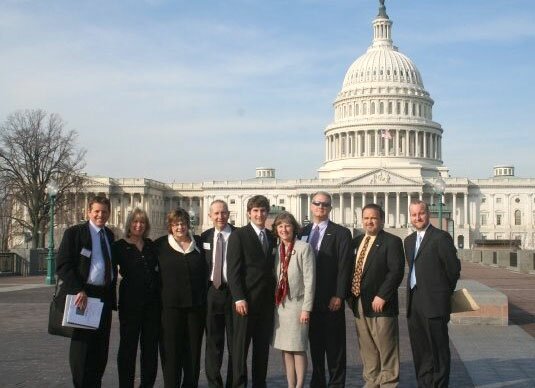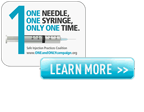Hepatitis Outbreaks’ National Organization for Reform (HONOReform)
-
HONOReform was formed in 2007 as a response to the tragic Nebraska Hepatitis C outbreak, in which 99 cancer patients in rural Fremont, Nebraska, were infected when healthcare providers reused syringes during administration of chemotherapy.
Far from an isolated event, the 2002 Nebraska outbreak is one of more than 50 documented outbreaks in the United States since the outbreak (http://www.cdc.gov/injectionsafety/pubs.html). Patients from all walks of life who were receiving care for multiple conditions in a wide variety of health care settings have been infected with bloodborne pathogens, including HCV (hepatitis C).
HONOReform is working at all levels – from local communities to Capitol Hill – to save lives by ensuring that fundamental injection safety practices are followed each and every time. The HONOReform mission is shaped by a three-pronged commitment to safety:
- Safety by Design through adoption of safe injection devices that are engineered to remove human error;
- Safety by Incentives to spur on faster adoption of infection control guidelines by healthcare professionals and administrators;
- Safety by Education and reeducation of healthcare workers regarding infection control – and empowerment of patients to ask questions and report concerns.
- By building safeguards into the injection process, incentivizing health care providers at all levels to universally follow fundamental safety standards, and educating and reeducating providers, all patients will be protected all the time. To achieve this goal, HONOReform works with healthcare stakeholders – including elected leaders, public health officials, patients, providers and industry – to make sure lessons are learned, standard practices are followed and lives are saved.

We are very proud of our accomplishments. Here are a few highlights:
-
In 2008, we co-convened with the Centers for Disease Control Foundation a meeting of stakeholders to advocate for injection safety. This meeting was the beginning of the Safe Injection Practices Coalition, which provides support for the One and Only Campaign.
Along with the Southern Nevada Health District, HONOReform Foundation debuted its Compassionate Response Toolkit on December 1, 2010, in Las Vegas. Our comprehensive toolkit, developed by Evelyn McKnight and others, provides much-needed information to men and women who are affected by bloodborne pathogens. More information, and a link to the toolkit, which is made available to individuals, is available at this Southern Neveda Health District website link. The toolkit continues to be a valuable resource for communities as we respond to the outbreaks that continue to occur.
Also in 2011, Evelyn McKnight joined colleagues from the CDC and AANA to present at “Injections without Infections,” a congressional briefing focused on the devastating effect of recent outbreaks–and the work being done to prevent future outbreaks caused by unsafe injection practices.
We contributed to the 2012 Government Accountability Office report, “HHS Has Taken Steps to Address Unsafe Injection Practices, But More Action is Needed (http://www.gao.gov/products/GAO-12-712).” This document spurred immediate action by Centers for Medicare & Medicaid Services and continues to be a foundation for ongoing healthcare safety work.
-
HONOReform formed and helps lead the Drug Diversion Prevention Committee, which is made up of a variety of key patient safety advocates, public health leaders, professional groups and state health department officials. Several members of this committee provided commentary in the April 17, 2014, USA Today article titled “Doctors, medical staff on drugs put patients at risk” which is considered to be the first national story on the prevalence of drug diversion in healthcare settings. While the problem has been recognized by a few state legislatures, a primary goal of the Drug Diversion Prevention Committee is the formation of a federal meeting to fully discuss this ongoing issue and develop an action plan. A variety of key organizations, including the Centers for Disease Control and Prevention, the Drug Enforcement Agency, and Health and Human Services Office of the Inspector General, have pledged their support for this meeting.
We entered the international injection safety arena with a fact-finding trip to India in 2014. In 2015 we addressed the Safe Injection Global Network of the World Health Organization for the launch of a new injection safety campaign (http://www.who.int/injection_safety/en/) in Geneva, Switzerland and also participated in the World Hepatitis Alliance in Glasgow, Scotland.
Throughout the years, we have been honored to address tens of thousands of healthcare providers and students from the patient perspective in a variety of educational opportunities on the critical need for injection safety, each and every time an injection is given. The feedback we receive from the providers keep us energized – especially when we hear, “I’m going to share your story with my colleagues, and we are going to make some changes!”





